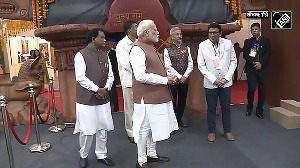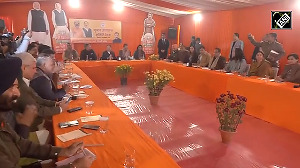If the political system and the economy of Pakistan continue to go down the tubes, nuclear weapons will not be able to save it, says Retired Brigadier General Feroz Khan. Aziz Haniffa reports
Notwithstanding all of the political, economic and security constraints that Pakistan is confronted with, the expansion of the nuclear weapons program in the country continues unabated and at an unrelenting pace.
Retired Brigadier General Feroz Khan, a lecturer in the Department of National Security Affairs at the Naval Postgraduate School in Monterey, California, and author of 'Eating Grass: The Making of the Pakistani Bomb,' told rediff.com that "the program is very much sustainable, and is being professionally managed."
In an interaction with rediff.com following his book launch, Khan said, "The people of Pakistan must take over ownership of the program in a broader sense."
"It's one thing to say, we are a nuclear-armed country, and yes, it's a rhetorical way to say nuclear-armed country, but when we look at the overall picture, as to what is happening in Balochistan, in Sind, and what is happening elsewhere, and how the economy, how the governance system is going on, that doesn't look like a nuclear-armed country's behaviour," he said.
Khan said, "Nuclear-armed countries are supposed to have a much more robust system in politics and economics and social systems. It seems to me the lack of governance in the country -- and that is what I am pointing out -- that if you are a nuclear-armed country, then this is all your responsibility. It's not simply just to keep on saying, we are a nuclear-armed country."
Khan, who represented Pakistan in several multilateral and bilateral arms control negotiations, and has been a visiting scholar at the Wilson Center, and has held fellowships at Stanford University, the Brookings Institution, the Center for Nonproliferation Studies in Monterey, and the Cooperative Monitoring Center at Sandia National Laboratory, lamented the lack of any serious debate within the civil societies in Pakistan on the nuclear weapons program and its continuing expansion.
"It's only being dominated by military-dominated institutions and they lead the process," he said, and acknowledged, "So far, they have done a tremendous job of actually converting a demonstrated deterrence into an operational deterrence. But what next?"
Khan argued that "this is beyond the capacity of the organisations to look into the nuclear policy matters and this has to be done in the parliament, etc."
He said, "Every program is sustainable to a certain point. There are technical, there are financial, they are resource constraints eventually. So, it's not runaway as much. For example, there is going to be a limit on how much uranium ore can be produced. That would be itself a constraining factor. A resource itself can be a constraining factor."
Khan said, "I am not shy of saying that nuclear weapons is not a panacea for national security, unless and until other elements of national power match up with this achievement and capability," and predicted, "nuclear weapons could soon become a liability rather than an actual military strength."
He said if the political system and the country's economy continue to go down the tubes, "nuclear weapons will not be able to save it. It might provide a level of deterrence, of prevention of total war, which it has. But beyond that, it will not be able to provide Pakistan the security that it is seeking."
He reiterated that "the people of Pakistan must determine two pathways; which way they want to take the country. Whether it will become more moderate country or whether there will be a radical take-over."
Khan said, "Both the possibilities and symptoms are available in the country as any observer can see, and it could go either way. And it is really a very important -- a defining moment for the people of Pakistan -- to determine which way the nuclear-armed Pakistan will head in the days ahead, particularly after the United States withdrawal from Afghanistan and the new paradigm changes that is happening at the systems levels within the next two-three years."
Meanwhile, asked to comment on a recent report in the Bulletin of the Atomic Scientists that Pakistan is now aiming to develop smaller and lighter atomic warheads more suitable for use on missiles, the former insider in the nuclear weapons establishment ridiculed the bulletin. "I don't know why the Bulletin of Atomic Scientists is saying this now because they (Pakistan) have been making lighter warheads for 20 years now," he said.
"Any warhead that is mountable on short-range ballistic missile systems are supposed to be a lighter warhead," he explained. "And particularly since they demonstrated Nasr about two years ago, it indicates that they are not just lighter warheads, but compact designs -- small implosion designs. That's pretty much an advanced technology."
The bulletin said, "Pakistan has shown clear signs of its intention to grow its nuclear arsenal. Most recently, the country has begun to increase its plutonium production capabilities, with two new plutonium production reactors under construction, as well as a new chemical reprocessing facility."
"The country's increased interest in plutonium demonstrates its likely goal to develop smaller, lighter warheads more suitable for use on missiles. In 2011, Nuclear Notebook reported that, in the next decade, Pakistan's arsenal could grow larger than that of Britain's," it said.
According to the Bulletin, "With stocks of fissile material sufficient for an arsenal of up to 200 nuclear warheads, Israel may have the largest stockpile among the nuclear-armed states, while both India and Pakistan each have around 100 warheads."
"Today, these three countries have the largest arsenals they have ever had. This growth trend among key nuclear-armed states stands in stark contrast to Britain, which, with an estimated 225 warheads, has the smallest arsenal of the nuclear weapon states; its arsenal peaked between 1975 and 1980 with 520 warheads," it noted.








 © 2025 Rediff.com -
© 2025 Rediff.com -